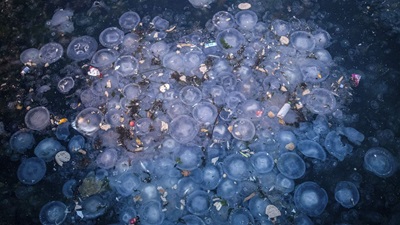EU Plastic Pellet Regulation Needs to Deliver Rapid Change
Spanish mayor explains how spills hurt local communities, nature and economies

Plastic pellet pollution is one of the largest sources of microplastic contamination in the European Union, yet until recently, it remained largely unregulated. EU decision makers are now in the final stages of adopting the first regulation on reducing plastic pellet spills on land and at sea. Pellets, the tiny plastic beads used to manufacture nearly all plastic products, are easily spilled during maritime transport, with devastating consequences for marine ecosystems and coastal communities.
In December of 2023, a pellet spill off the coast of Portugal and northwest Spain had a major impact on the shores and local livelihoods of the Spanish island of A Illa de Arousa. An interview with the island’s mayor, Luis Arosa, explains how his community is dealing with microplastic pollution. This interview has been edited for length and clarity.
What makes A Illa de Arousa particularly vulnerable to plastic pellet pollution?
Our island is deeply connected to the ocean: 80 per cent of our residents depend directly on the sea for their livelihoods, primarily through mussel farming, shellfish harvesting and fishing. A Illa de Arousa is also home to Carreirón Natural Park, part of Europe’s Natura 2000 network and a Ramsar site – meaning it’s recognized as an internationally important wetlands site under the 1971 Ramsar treaty – renowned for its diverse bird life. When plastic pellet pollution strikes, it threatens not only our environment but also the heart of our local economy and our community’s well-being.
How did the December 2023 plastic pellet spill affect your community?
The spill brought millions of plastic pellets to our shores, contaminating our beaches and threatening local wildlife. Our community mobilized immediately: Volunteers and municipal workers tried everything to clean up the spill, from using leaf blowers and sifting sand to floating the pellets in water containers to separate them. Yet despite our efforts, we inadvertently buried pellets deeper into the sand, complicating cleanup. Birds in Carreirón undoubtedly ingested pellets, highlighting the immediate and long-lasting environmental harm.
Who has borne the cost of cleanup efforts?
Sadly, the financial, logistical and emotional burden has fallen squarely on our local government and community. We’ve received no compensation or clear guidance from higher authorities. With no regulations in place at the time of the spill to define responsibilities or ensure a rapid response, we were left alone to manage a crisis we didn’t cause. This experience exemplifies the consequences of regulatory gaps and the urgent need for strong, enforceable rules to prevent future disasters and protect coastal communities.
Is your island’s experience unique in Europe?
Unfortunately not. Our community’s story mirrors others across Europe: There were pellet spills in the Dutch Wadden Sea in 2019 and off the coasts of Denmark, Norway and Sweden in 2020. And millions of pellets washed up in Brittany, France, between 2022 and 2023. Just recently, in mid-March, a collision between two ships off England’s Norfolk coast led to thousands of pellets being washed ashore. [More information here.]

So what happens in cases like this, when plastic pellets reach the marine environment?
The consequences are severe and lasting. Marine life, including birds and fish, mistake these tiny plastic beads for food, so they ingest them – which not only exposes them to harmful toxins but also can block their food passages so that they can’t take in real food and they starve. Studies have shown that an alarming 92 per cent of the North Sea birds known as fulmars have plastic, including pellets, in their stomachs. These impacts ripple through ecosystems and threaten biodiversity.
If there are no regulations and plastic pellet spills continue, who suffers the most?
Local governments and communities like A Illa de Arousa will bear the brunt. We’re the ones funding cleanups, dealing with long-term environmental damages and facing ongoing economic repercussions. Businesses and regulators at a distance from the immediate impact areas don’t experience the daily burden we carry.
What would you like the European Union to do to address this problem?
I am delighted that in April 2025, the EU concluded negotiations on new legislation to prevent plastic pellet loss into the environment which requires that shippers have specific maritime measures in place when transporting plastic pellets. The European Parliament already adopted the text in May. Now we wait for the Council of the EU to also finally adopt the regulation. It’s an important step forward – the inclusion of a mandatory shipping regulation closes regulatory gaps that have allowed pellets to be transported without adequate safety measures.
Can you say more about why regulating maritime transportation is crucial in addressing pellet pollution?
Spills have proliferated unchecked because to date, Europe has no clear, enforceable regulations covering maritime transport of plastic pellets. Recently, voluntary guidelines proposed by the International Maritime Organization (IMO) – such as labelling of containers that carry plastic pellets, protocols to notify authorities of spills, and improved practices for stowing plastic pellets aboard ships – have gained EU support. With the new regulation, these previously voluntary IMO guidelines will become mandatory within the EU, marking a significant step forward in reducing pellet spills at sea through enforceable, low-cost preventive measures.
Do you have a final message for European decision makers?
Europe’s coastal communities cannot afford further delays. Now that the regulation has been provisionally approved, it’s critical that it is formally adopted and enters into force as soon as possible. We need clear, enforceable rules to prevent disasters like the 2023 spill from happening again – here in Galicia, or anywhere else in Europe. But the problem doesn’t stop at our borders. Communities around the world are facing similar threats. That’s why the EU should continue to lead globally by advocating for strong maritime measures in international negotiations – at the IMO and in the plastics treaty talks – to ensure that voluntary guidance becomes binding and effective everywhere.








